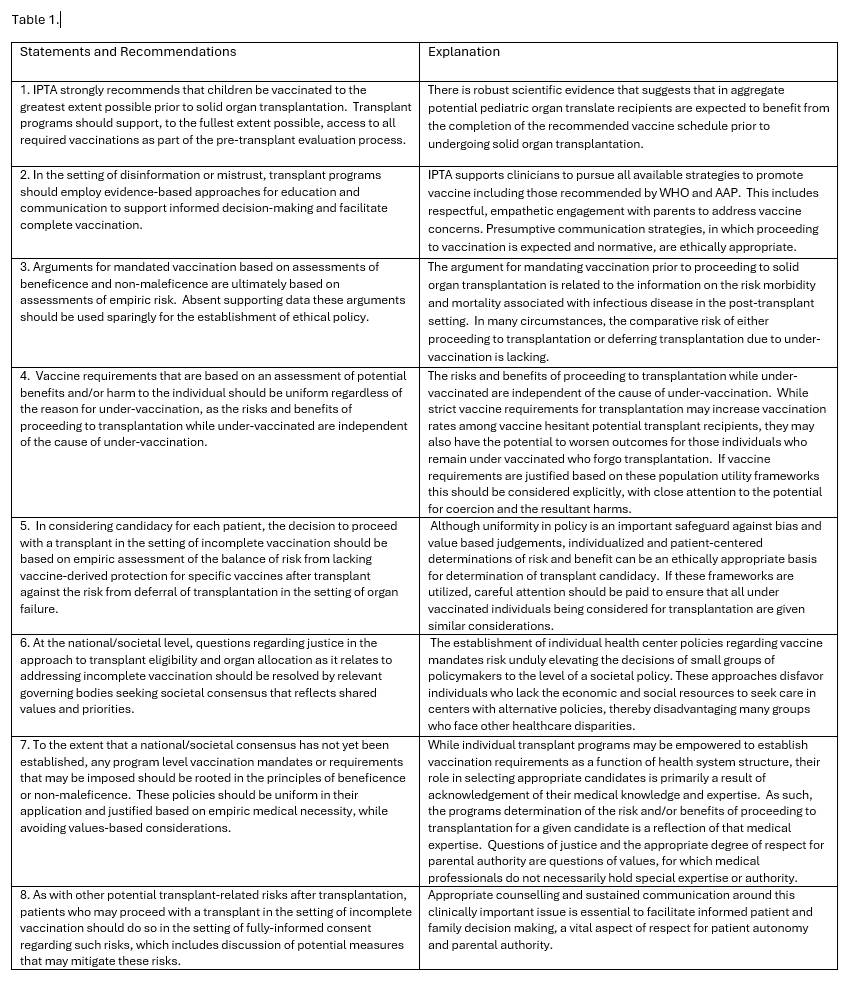An ethical analysis and developmental process to establish an IPTA position statement regarding mandated vaccination prior to transplantation
Mihaela Damian1, Michael Freeman2, Mignon McCulloch3, Sanjay Rao4, Aaron Wightman5, Tom Blydt-Hansen6.
1Pediatrics, Emory University, Atlanta, GA, United States; 2Pediatrics and Humanities, Penn State College of Medicine, Hershey, PA, United States; 3Paediatrics, University of Cape Town, Cape Town, South Africa; 4Department of Pediatric Surgery, Mazumdar Shaw Multispecialty Hospital, Bangalore, India; 5Pediatrics, University of Washington School of Medicine, Seattle, WA, United States; 6Pediatrics, University of British Columbia, Vancouver, BC, Canada
Background: The IPTA Ethics Committee has been asked to develop position statements on complex ethical issues on behalf of the society. Although there is broad consensus that pre-transplant vaccination decreases the risk of many preventable diseases, how to adjudicate eligibility for a transplant when patients/parents refuse some or all vaccines remains a major ethical challenge. Some transplant programs have a policy that failing to complete required vaccinations will render a transplant candidate ineligible for listing, whereas other transplant programs may be more permissive. This lack of uniformity in approach can contribute to disparities in care. We therefore seek to explore the ethical basis for vaccination-based eligibility and formulate recommendations for a unified framework of statements and considerations to assist transplant programs and broader national societies in considering this complex issue.
Methods: The Committee formed a working group to develop a draft policy. When finalized among the working group, the draft product will then be subjected to review and revision, based on consultation with the full ethics committee, society leadership and broadly from the membership, prior to approval. We are at the drafting stage in the process.
Considerations in this ethical analysis included assessments of the potential benefits and/or harms experienced by potential recipients for whom vaccination may be required, concerns for appropriate respect for and the limits of parental authority, and societal considerations including organ stewardship, the social contract implicit in organ allocation practices, broader considerations of population safety, and disparities in opportunities for transplant, particularly among marginalized people. These were assessed within a standard Principlism framework, addressing questions of Beneficence, Non-maleficence, Autonomy and Justice.
Results: The working group proposes for consideration the following statements and recommendations, as described in Table 1. A brief explanation of the ethical justification for each statement is included. These will be explored in greater detail in the draft document.
Conclusion: These recommendations are proposed for discussion among the IPTA membership, and we will incorporate received feedback into subsequent revisions of the document.
[1] Ethics
[2] Vaccination
[3] Vaccine
[4] Transplant Candidacy
[5] Organ Allocation